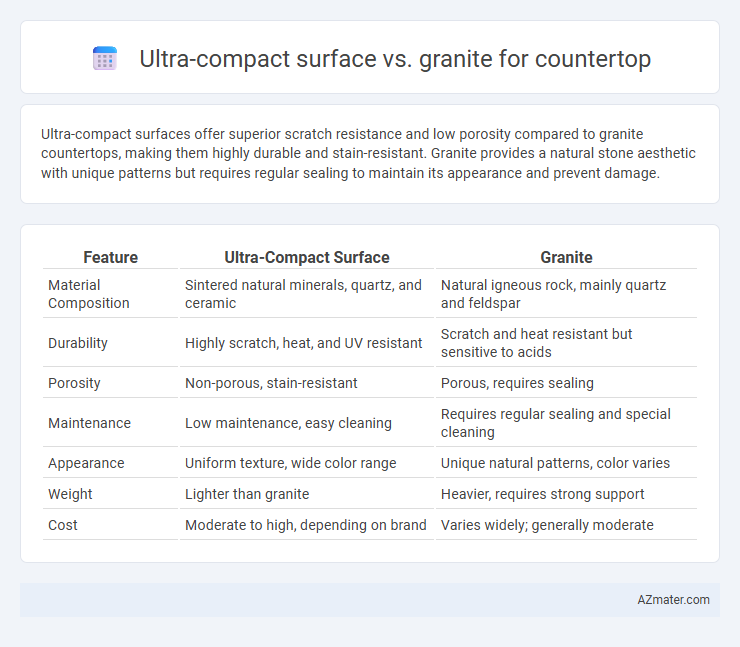Ultra-compact surfaces offer superior scratch resistance and low porosity compared to granite countertops, making them highly durable and stain-resistant. Granite provides a natural stone aesthetic with unique patterns but requires regular sealing to maintain its appearance and prevent damage.
Table of Comparison
| Feature | Ultra-Compact Surface | Granite |
|---|---|---|
| Material Composition | Sintered natural minerals, quartz, and ceramic | Natural igneous rock, mainly quartz and feldspar |
| Durability | Highly scratch, heat, and UV resistant | Scratch and heat resistant but sensitive to acids |
| Porosity | Non-porous, stain-resistant | Porous, requires sealing |
| Maintenance | Low maintenance, easy cleaning | Requires regular sealing and special cleaning |
| Appearance | Uniform texture, wide color range | Unique natural patterns, color varies |
| Weight | Lighter than granite | Heavier, requires strong support |
| Cost | Moderate to high, depending on brand | Varies widely; generally moderate |
Introduction to Ultra-Compact Surfaces and Granite
Ultra-compact surfaces are engineered materials composed of natural minerals like quartz, porcelain, and glass, offering extreme durability, heat resistance, and non-porous properties ideal for countertops. Granite, a natural igneous rock formed from cooled magma, is prized for its unique patterns, hardness, and resistance to scratches and heat, commonly used in kitchen and bathroom surfaces. Both ultra-compact surfaces and granite deliver aesthetic appeal and functional benefits, but ultra-compact surfaces often provide superior stain resistance and lower maintenance compared to traditional granite countertops.
Material Composition and Manufacturing Process
Ultra-compact surfaces are engineered using a blend of natural quartz, porcelain, and glass, combined through high-pressure and high-temperature sintering to create a dense, non-porous material resistant to scratches and stains. Granite, a natural igneous rock composed primarily of quartz, feldspar, and mica, is quarried and then cut and polished for use as a countertop, offering unique patterns and inherent durability. The manufacturing process of ultra-compact surfaces ensures uniformity and enhanced physical properties compared to granite's variability due to natural formation.
Aesthetic Variety and Design Options
Ultra-compact surfaces offer a broader range of vibrant colors, patterns, and textures compared to granite, enabling highly customizable and contemporary designs. Granite presents natural, unique veining and color variations, appealing to traditional and classic aesthetics with limited color options. Designers favor ultra-compact materials for sleek, uniform finishes, while granite remains prized for its organic, timeless beauty.
Durability and Resistance to Damage
Ultra-compact surfaces offer exceptional durability due to their low porosity and high resistance to scratches, stains, and heat, outperforming granite in everyday wear and tear. Granite, while naturally strong and heat-resistant, is more susceptible to chipping and requires regular sealing to maintain its resistance to stains and moisture. Ultra-compact materials provide superior resistance to chemical damage and impact, making them a long-lasting and low-maintenance choice for countertops.
Maintenance Requirements
Ultra-compact surfaces require minimal maintenance, being highly resistant to stains, scratches, and heat, which reduces the need for regular sealing or special cleaning products. Granite countertops demand more upkeep, including periodic sealing to prevent porosity-related staining and the use of pH-neutral cleaners to maintain their finish. Choosing ultra-compact material offers a more hygienic and low-maintenance option compared to the natural stone maintenance routine of granite.
Environmental Impact and Sustainability
Ultra-compact surfaces, composed of natural raw materials like quartz, feldspar, and porcelain, offer superior sustainability due to their low water usage in manufacturing and minimal waste production compared to granite quarrying, which involves significant land disruption and energy consumption. Granite countertops, although durable, often require extensive mining practices that contribute to habitat destruction and carbon emissions from extraction and transportation. Choosing ultra-compact surfaces reduces environmental impact through their recyclable properties and longer lifespan, supporting eco-friendly construction and waste reduction in countertop applications.
Cost Comparison and Value for Money
Ultra-compact surfaces typically cost between $60 and $120 per square foot, offering superior durability, stain resistance, and low maintenance compared to granite, which ranges from $40 to $100 per square foot but may require periodic sealing and repair. While granite provides a natural stone aesthetic with unique patterns, ultra-compact materials deliver enhanced scratch and heat resistance, translating to longer lifespan and better return on investment. Considering long-term value for money, ultra-compact countertops present reduced upkeep expenses and higher resilience, making them a cost-effective choice for modern kitchens.
Installation Process and Considerations
Ultra-compact surfaces offer a lightweight and thinner profile, simplifying handling and reducing installation time compared to the heavier and bulkier granite slabs. Granite requires precise cutting and skilled labor due to its natural variability and weight, increasing installation complexity and time. Contractors must consider substrate strength and environmental conditions, as ultra-compact materials can better withstand temperature changes and moisture without compromising adhesion.
Pros and Cons: Ultra-Compact Surfaces vs Granite
Ultra-compact surfaces offer exceptional durability, high resistance to scratches, stains, and heat, making them ideal for heavy-use countertops. Granite provides a natural aesthetic with unique patterns and retains heat moderately but requires regular sealing to prevent staining and bacterial growth. While ultra-compact surfaces are low-maintenance and non-porous, granite offers a timeless, organic appeal at the cost of higher upkeep and potential cracking.
Choosing the Right Countertop for Your Needs
Ultra-compact surfaces offer exceptional durability, resistance to scratches, stains, and heat, making them ideal for high-traffic kitchens requiring low maintenance. Granite provides natural beauty with unique patterns and strong heat resistance but demands sealing to prevent stains and requires more upkeep. Selecting the right countertop depends on balancing aesthetic preferences, maintenance willingness, and durability needs for your specific kitchen environment.

Infographic: Ultra-compact surface vs Granite for Countertop
 azmater.com
azmater.com